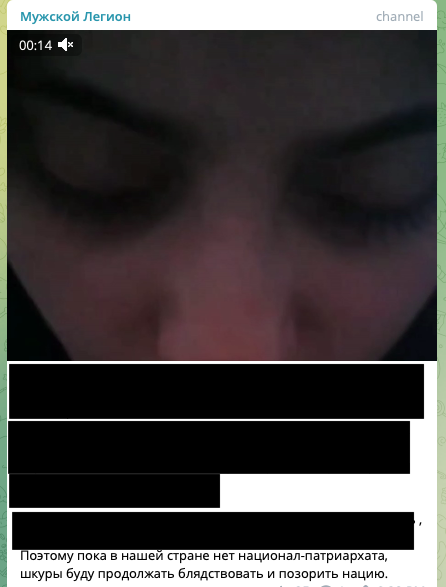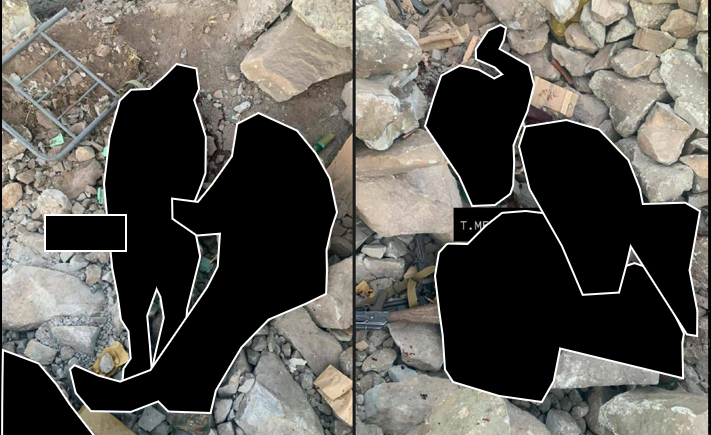
A video surfaces online from occupied Ukraine, showing the movement of a Russian mil 2023-9-19 02:1:39 Author: www.bellingcat.com(查看原文) 阅读量:9 收藏
A video surfaces online from occupied Ukraine, showing the movement of a Russian military convoy from afar. When investigating the footage, we discover that it was filmed by a Ukrainian civilian from inside their apartment. Sharing the full geolocation demonstrates transparency, building trust at a time when disinformation about footage from Ukraine is rampant. But it could also endanger the civilian who recorded it, who might face reprisals from the Russian occupiers for recording their military movements.
This is one scenario is based on a composite of several ethical dilemmas we have faced at Bellingcat. It may be similar to those which other open source researchers face in their work.
Jennefer Harper was one of many open source researchers who sprung into action following the Russian invasion of Ukraine in February 2022. An independent researcher, Jennefer formed part of the massive, grassroots response to the invasion that saw individuals from all walks of life — from seasoned digital investigators to newcomers to the field — begin the work of documenting every aspect of the war through digital open sources.
During those early months of the war, Jennefer worked on a project to build a database with the personal details of the Russian soldiers taking part in the invasion. While the task was massive, its goal was simple: to create and preserve a list of soldiers possibly involved in the commission of war crimes. As the world came to know the name Bucha and that of other sites of massacres committed by Russian soldiers in Ukraine, Jennefer’s work could not have been more necessary.
And yet, Jennefer wonders to this day whether what she did was ethical.
“I struggled with the thought that quite likely many [of the soldiers on the list] had little choice in joining the war and many were forced by the Russian government to serve,” Jennefer recalls. She also wondered how many of the names that she had collected belonged to men who had been “sent to their deaths” by a government that they did not support, in a war in which they did not believe.
The collection, analysis, and preservation of digital evidence of violations during Russia’s full-scale invasion of Ukraine has been a focus of a range of open source researchers like Jennefer. The hope is that this evidence may help bring accountability for violations of human rights. Jennefer’s experience is testament to how ethical dilemmas permeate digital open source research.
At Bellingcat, we are often faced with ethical dilemmas. For example, we have been faced with situations where publishing every detail of an investigation into a far-right group may risk amplifying their hateful messages, or where publishing our methods might result in a tool being shut down by a social media giant. As Bellingcat’s Hannah Bagdasar has written, investigating material about sexual and gender-based violence (SGBV) brings an entire range of ethical quandaries with it. In these situations, it may seem like none of the options are ideal.

Luckily, there are several blueprints for conducting ethical digital open source investigations. As you’ll read in this article, these blueprints have helped to inform our own processes for navigating ethical dilemmas in the hopes of not only addressing these adequately on our own, but also to help to set an example for other organisations.
Blueprints for Ethics in Open Source Research
These ethical dilemmas are not unique to Bellingcat. Other practitioners of open source digital investigations deal with them as well. While traditional media organisations which publish open source investigations may already have the benefit of broad guidelines informed by journalistic ethics, specialised ethics frameworks for open source researchers are comparatively new. These efforts are exemplified by initiatives like the University of California’s Berkeley Protocol on Human Rights Investigation and by the US-based Stanley Centre for Peace and Security’s “The Gray Spectrum: Ethical Decision Making with Geospatial and Open Source Analysis.”
The Berkeley Protocol contains a section on ethical principles to keep in mind while conducting digital open source research, the idea being that adherence to these principles (such as non-discrimination, transparency and humility) can lead to successful navigation of the dilemma.

“The Gray Spectrum” provides practical advice by laying out steps for recognising, evaluating and acting on ethical dilemmas. Borrowing from the Markkula Centre for Applied Ethics at Santa Clara University in California, the document “aims to start a conversation” about ethical decision-making in open source research by providing a framework through which to think about these issues.
The Stanley Centre has also published other documents exploring practical ethical decision making in open source research, including one based on interviews with practitioners who have had to navigate ethical challenges in their work, along with a “workbook for applied ethics” in open source research. The workbook is packed with real-life dilemmas that practitioners have had to face in the field — including one taken from Bellingcat — and includes a series of steps to help you identify the dilemma at hand, weigh your options, and think it through in a systematic way.
Sometimes, approaches to ethical decision making depend entirely on the kind of research you’re doing. As Robert Evans argued after the Christchurch massacre in 2019, far-right extremists openly crave the the notoriety which comes after journalists share their manifestos and hateful messages. That presents particular challenges for open source researchers working on extremist groups; while it isn’t tailored especially for open source researchers, the Data Society’s Oxygen of Amplification report contains useful insights on how to cover online extremist material transparently, responsibly and ethically.
In 2022, the Human Rights, Big Data, and Technology Project at the University of Essex in the UK published a report detailing a “Human-Rights Based Approach to Open Source Investigations.” The report calls on open source investigators to be mindful that their work may interfere with the rights of the people they are researching, and that it may even put them at risk.
Chris Osieck is an open source researcher who investigates a variety of topics including human rights violations in the Israeli-Palestinian conflict. He stresses the importance of keeping the people you are investigating in mind as you research:
“The people that are visible in the videos and images exist just as much as you and I do.” While the researcher is working from the comfort and relative safety of their own home, [the people in the images] are actually dealing with war, occupation, and oppression.”
— Chris Osieck
For Chris, open source research in itself poses ethical questions, as the relationship between the researcher and the subjects of his digital gaze is highly complex.
Navigating Ethical Dilemmas at Bellingcat
Bellingcat has developed internal practices to help us navigate these tricky waters.
The Bellingcat Ethics Committee is a body of staff who debate ethical dilemmas as they present themselves, offering advice on solutions. We are guided in these discussions by our Editorial Standards & Practices, Principles for Data Collection, other research on ethics and open source investigations and by Bellingcat’s core principles and values. These act as a compass by which we can navigate ethical dilemmas.
The Bellingcat Ethics Committee is convened whenever a staff member encounters an ethical dilemma in their work. The committee hears the issue and then discusses different possible outcomes. Once the committee has reached a consensus, its decision is logged to help act as precedent for future cases. Among other benefits, this process allows us to ensure institutional memory so that future staff members can look to past decisions for guidance when faced with ethical challenges themselves.
Bellingcat’s Ethics Committee is a work in progress. We are constantly learning from our experiences and making adjustments to help ensure that we are making the best decisions possible with the information that is available.
Towards More Ethical Decision Making in Open Source Research
Bellingcat researcher Aiganysh Aidarbekova is particularly interested in conducting investigations into public figures suspected of corruption. This research sometimes involves collecting information on the relatives of the subject of an investigation in order to establish connections between individuals and places. But sometimes these relatives are not implicated in wrongdoing themselves.
Conducting research that involves the relatives of the subject of an investigation is ethically challenging, Aiganysh explains, because open source researchers “are expected to show details” of their investigation, including any links that they may have found between individuals. However, in these cases, “you don’t want a relative’s personal info being public” out of a concern for their privacy and safety, and so researchers are faced with a choice:
“Either you tell the audience how you did the open source research or respect [relatives’] rights and not publish much.”
— Aiganysh Aidarbekova
As Scientific American magazine recently wrote, simply reporting every finding of an investigation comes with significant risks; the fact that content has circulated on social media does not absolve open source researchers of the need to think critically of the costs of amplifying it or of promoting an incorrect interpretation of what it shows.
This is why values like transparency and humility are a starting point for any ethical consideration. Sometimes, as Aiganysh explained, transparency cannot always override valid ethical concerns: the answer to an ethical dilemma sometimes means, frustratingly, showing less than you would like or even not publishing at all.
The purpose of this article is not to present Bellingcat’s experience or approaches as the ultimate solution to the ethical dilemmas that you may face as a researcher.
Rather, we want to share the work of other organisations whose insights have helped us develop our own best practice and to invite the wider open source community to consider ethical decision-making in their research and continue the conversation.
Are you interested in the ethics of open source research? Would you like to connect with other open source researchers, and explore this topic more? Join the Bellingcat Discord server!
如有侵权请联系:admin#unsafe.sh